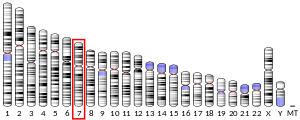Olfactory receptor 6V1 is a protein that in humans is encoded by the OR6V1 gene.[3][4]
Olfactory receptors interact with odorant molecules in the nose, to initiate a neuronal response that triggers the perception of a smell. The olfactory receptor proteins are members of a large family of G-protein-coupled receptors (GPCR) arising from single coding-exon genes. Olfactory receptors share a 7-transmembrane domain structure with many neurotransmitter and hormone receptors and are responsible for the recognition and G protein-mediated transduction of odorant signals. The olfactory receptor gene family is the largest in the genome. The nomenclature assigned to the olfactory receptor genes and proteins for this organism is independent of other organisms.[4]
References
- 1 2 3 ENSG00000225781 GRCh38: Ensembl release 89: ENSG00000277378, ENSG00000225781 - Ensembl, May 2017
- ↑ "Human PubMed Reference:".
- ↑ Vanti WB, Nguyen T, Cheng R, Lynch KR, George SR, O'Dowd BF (May 2003). "Novel human G-protein-coupled receptors". Biochem Biophys Res Commun. 305 (1): 67–71. doi:10.1016/S0006-291X(03)00709-5. PMID 12732197.
- 1 2 "Entrez Gene: OR6V1 olfactory receptor, family 6, subfamily V, member 1".
External links
This article incorporates text from the United States National Library of Medicine, which is in the public domain.
|
|---|
Class I
(fish-like specific receptors) | | Family 51 | |
|---|
| Family 52 | |
|---|
| Family 56 | |
|---|
|
|---|
Class II
(tetrapod specific receptors) | | Family 1 | |
|---|
| Family 2 | |
|---|
| Family 3 | |
|---|
| Family 4 | |
|---|
| Family 5 | |
|---|
| Family 6 | |
|---|
| Family 7 | |
|---|
| Family 8 | |
|---|
| Family 9 | |
|---|
| Family 10 | |
|---|
| Family 11 | |
|---|
| Family 12 | |
|---|
| Family 13 | |
|---|
|
|---|

